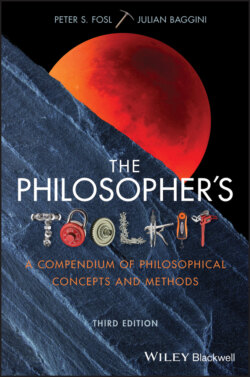Читать книгу The Philosopher's Toolkit - Julian Baggini, Julian Baggini - Страница 20
Grounds for premises and Agrippa’s trilemma?
ОглавлениеThere are several important accounts about how a premise can be acceptable. One is that the premise is itself the conclusion of a different, solid argument (perhaps a nested argument). As such, the truth of the premise has been demonstrated elsewhere. But it is clear that if this were the only kind of justification for the inclusion of a premise, we would face an infinite regress. That is to say, each premise would have to be justified by a different argument, the premises of which would have to be justified by yet another argument, the premises of which … ad infinitum.
Now, there are philosophers called infinitists for whom regresses of this sort are not problematic. Unless, however, one wishes to live with the infinite regress, one must find another way of determining sentences acceptable to serve as premises.
A compelling option for many has been to conceive of truths not as a hierarchy but rather as a network so that it’s the case that justifications ultimately just circle back around to compose a coherent, mutually supporting but ultimately anchor‐less web. The objective of philosophers and other theorists, from this point of view, becomes a project of conceptual weaving and embroidery, stitching together concepts and arguments in consistent and meaningful ways to construct a coherent conceptual fabric. Philosophers who conceive of truths, theories, and reasoning in this way are called coherentists.
Philosophers who object to infinite regresses of justification and who find in the coherentist vision just vicious circularity often look for something fundamental or foundational, a stopping point or bedrock for reasons and justification. Philosophers of this sort are often called foundationalists. There must be for foundationalists premises that stand in need of no further justification through other arguments. Let’s call them ‘basic premises’.
There’s been a lot of ink spilled about what are to count as basic premises and why they are basic. By some accounts (called contextualist), the local context in which one is reasoning determines what’s basic. For example, a basic premise might be, ‘I exist’. In most contexts, this premise does not stand in need of justification. But if, of course, the argument is trying to demonstrate that I exist, my existence cannot be used as a premise. One cannot assume what one is trying to argue for.
Other kinds of philosophers have held that certain sentences are more or less basic for other reasons: because they are based upon self‐evident or ‘cataleptic’ perceptions (stoics), because they are directly rooted in sense data (positivists), because they are grasped by a power called intuition or insight (Platonists), because they make up the framework of any possible inquiry and therefore cannot themselves be the objects of inquiry (Kantians, Wittgensteinians), because they are revealed to us by God (theologians), or because we grasp them using cognitive faculties certified by God (Cartesians).
Other philosophers, principally sceptics, have challenged the idea that an ultimate ground can be given at all for reasoning. Appeals to neither (1) regresses, nor (2) circles, nor (3) foundations ultimately work. The problem is an old one and has been popularly described as ‘Agrippa’s trilemma’. See Graeco‐Roman Diogenes Laëritus’s Lives of Eminent Philosophers (9.88–89) and Sextus Empiricus’s Outlines of Pyrrhonism (PH 1.15.164) for the details.
Formally, then, the distinction between premises and conclusions is clear. But it is not enough to grasp this difference. In order to use these philosophical tools, one has to be able both to spot the explicit premises and to make explicit the unstated ones. The philosophical issues behind that distinction, however, are deep. Aside from the question of whether or not the conclusion follows from the premises, one must come to terms with the thornier questions related to what justifies the use of premises in the first place. Premises are the starting points of philosophical argument. One of the most important philosophical issues, therefore, must be the question of where and how one begins.
